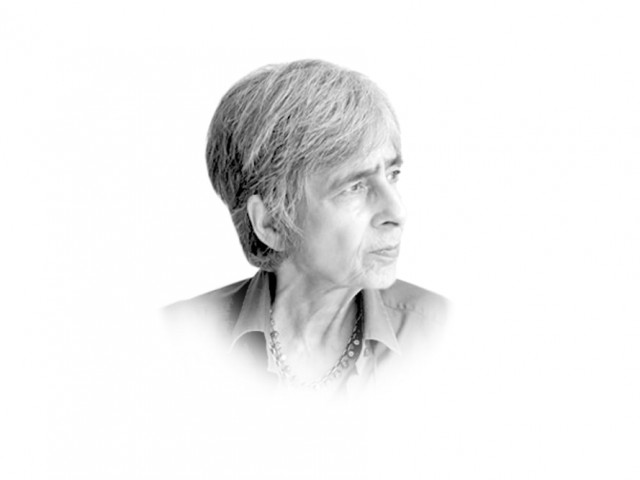Not even the cradle
Gilani's is the case of yesterday’s men who cling on & on, carrying on their merry way regardless of consequences.

Not even the cradle
As Justice Asif Saeed Khosa of the Supreme Court, waxing lyrical, put it in his separate note to the detailed verdict of the contempt case against the prime minister convicting him, when adding his own “Pity the nation” stanzas to those of Khalil Gibran: “Pity the nation whose leaders seek martyrdom through disobeying the law [rather] than giving sacrifices for the glory of law and who see no shame in crime. Pity the nation that is led by those who laugh at the law little realising that the law shall have the last laugh”.
Well, the law has not often had the last laugh in this pitiful democracy and as things are going it seems that in the present case it may be denied to some extent. For the moment, Mr Gilani is not exhibiting the slightest bit of remorse. He flew off to London on the day the verdict was released with his band of chosen many, again, during his flight jibing at the court with the remark: “Why should I fear those who are against the Constitution?” He has learnt nothing, but then he is no stranger to convictions having been convicted in 2001 by an anti-corruption court.
He is also no stranger to the convoluted political games played in this country. He, like most of those who occupy positions of political power, is very much yesterday’s man. His political career took off in 1978 when he joined the Central Working Committee of the PML, together with Nawaz Sharif — 34 years ago! In 1985, he was ‘elected’ to General Ziaul Haq’s Majlis-e-Shoora. Admittedly, he didn’t last too long and switched over to the PPP, whether ideologically or expediently motivated. He successfully contested the 1988 elections and was rewarded with his first ministry — that of tourism.
So he is neither, obviously we would assume, devoid of grey cells or of experience. They are both, in his case, misdirected and misguided. And this is the case with all of yesterday’s men who cling on and on, carrying on in their own merry way regardless of any consequences or of the mockery they make of democracy and their country.
In functioning democracies, men and women come and go with the times and with their abilities. When they have served their time, they make way for new blood. Not so in this pitiful nation in which positions of power are deemed to be a ‘right’ by the followers of slain leaders. There is no giving way. Justice Khosa, this time using Gibran’s words, put it well: “Pity the nation whose sages are dumb with years and whose strong men are yet in the cradle”.
The problem is that in our dynastic form of politics even the cradles are suspect. The offspring of the large majority of yesterday’s men, those who have managed to wangle their way in and out of power for over three decades, are hovering in the wings, awaiting their turn. So what price, fresh, new untainted blood? We have before us the examples of the sons of our convicted prime minister. And of course, what passes for the opposition has its own share of progeny whose acts of commission have not exactly endeared it to those citizens who are convinced that unless the leadership undergoes a radical sea change, this country can never emerge from its bog of corruption, mendacity, and sheer incompetence.
Published in The Express Tribune, May 12th, 2012.












COMMENTS
Comments are moderated and generally will be posted if they are on-topic and not abusive.
For more information, please see our Comments FAQ